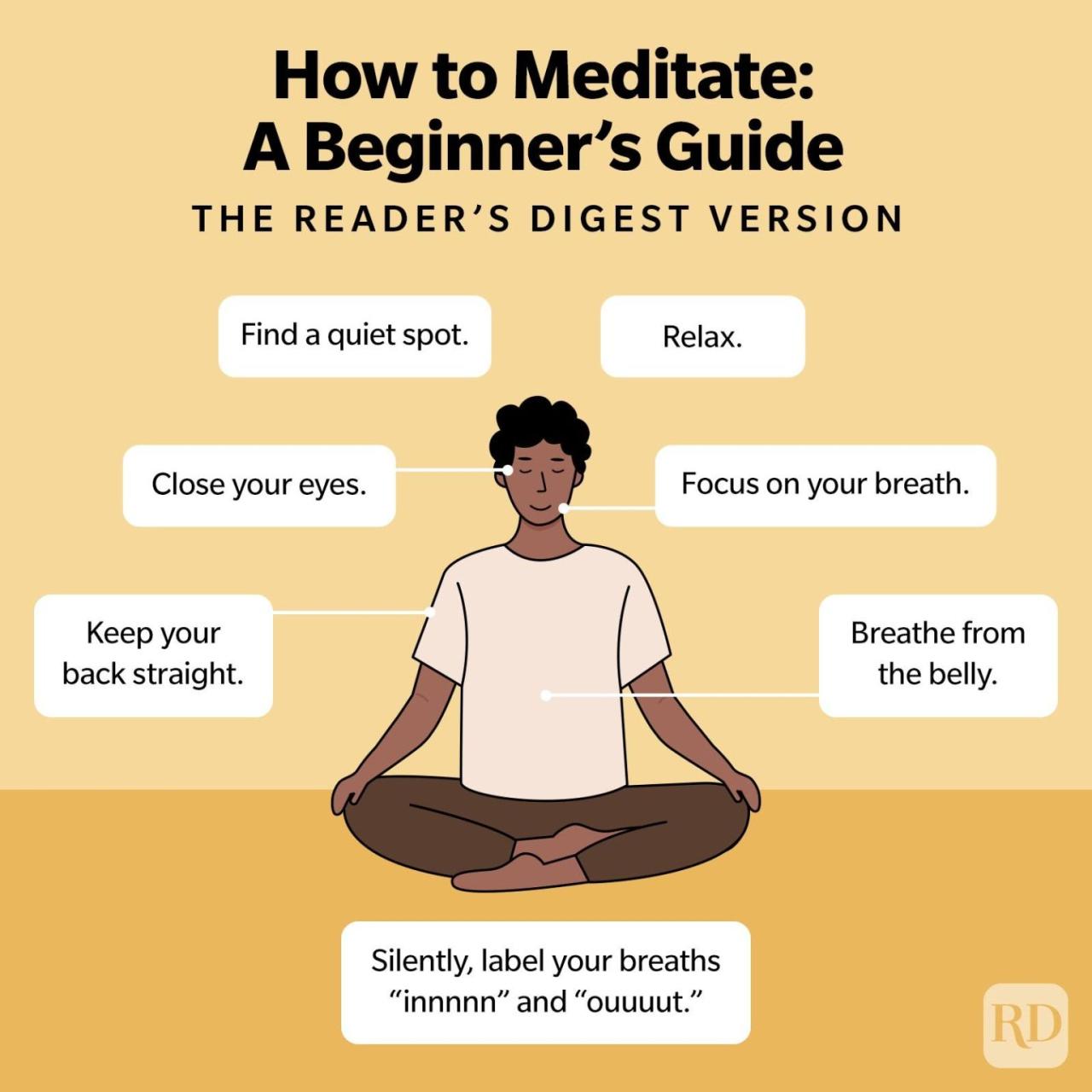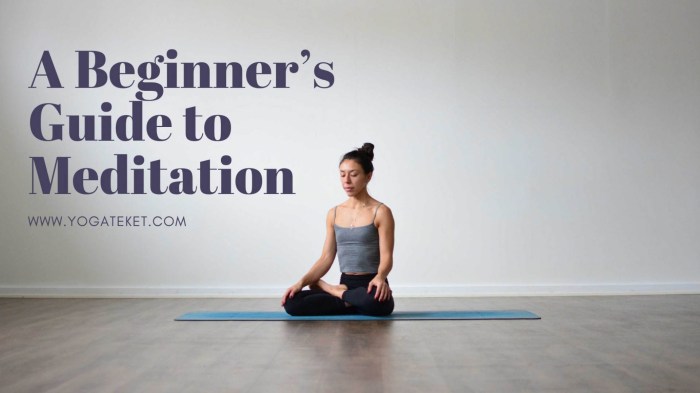Kicking off with Meditation for Beginners, this guide will take you on a journey to discover the benefits, techniques, and tips to kickstart your meditation practice like a boss. Get ready to zen out!
Benefits of Meditation for Beginners

Starting a meditation practice can bring a wide range of benefits for beginners, from physical improvements to mental health advantages, ultimately leading to an overall sense of well-being.
Physical Benefits:
- Reduced stress levels
- Improved sleep quality
- Enhanced immune function
- Lowered blood pressure
Mental Health Advantages:
- Decreased anxiety and depression symptoms
- Increased focus and concentration
- Enhanced self-awareness and emotional regulation
- Improved mood and overall mental well-being
Overall Well-being Improvement:
- Greater sense of calm and relaxation
- Boosted feelings of happiness and contentment
- Increased resilience to life’s challenges
- Enhanced mindfulness and present moment awareness
Different Types of Meditation for Beginners
When it comes to meditation, beginners have a variety of techniques to choose from. Each type offers unique benefits and approaches to help calm the mind and improve overall well-being.
Mindfulness Meditation
Mindfulness meditation involves focusing on the present moment without judgment. It helps beginners develop awareness of their thoughts and emotions, leading to increased clarity and reduced stress levels.
- Practice: Sit quietly and observe your thoughts without getting attached to them. Focus on your breath or a specific sensation in your body.
- Benefits: Improved focus, reduced anxiety, and enhanced self-awareness.
Loving-Kindness Meditation
Loving-kindness meditation, also known as Metta meditation, involves cultivating feelings of compassion and love towards oneself and others. It helps beginners develop a sense of connection and empathy.
- Practice: Start by directing loving-kindness towards yourself, then towards loved ones, neutral people, and eventually towards difficult individuals.
- Benefits: Increased feelings of kindness, improved relationships, and reduced negative emotions.
Guided Meditation Resources for Beginners
Guided meditations can be particularly helpful for beginners as they provide instructions and support throughout the practice. Here are some resources to get you started:
- Headspace: A popular app offering guided meditations for various purposes, including stress relief and better sleep.
- Calm: Another app with a wide range of guided meditations, breathing exercises, and sleep stories.
- YouTube Channels: Search for channels like “The Honest Guys” or “Yoga With Adriene” for guided meditation videos suitable for beginners.
Setting Up a Meditation Space
Creating a peaceful and conducive environment for meditation is essential for beginners to establish a regular practice. Here’s how you can set up an ideal meditation space and make it comfortable and distraction-free.
Elements of a Beginner’s Meditation Space
- Choose a quiet and clutter-free area: Select a spot in your home where you can sit comfortably without distractions.
- Add elements of nature: Incorporate plants, natural light, or even a small indoor fountain to create a calming atmosphere.
- Use calming colors: Opt for soft, soothing colors like light blue, green, or lavender to promote relaxation.
- Comfortable seating: Invest in a cushion or meditation bench to support proper posture during meditation.
Tips for a Comfortable Meditation Space, Meditation for Beginners
- Avoid electronic devices: Keep your phone on silent or in another room to minimize distractions.
- Set the mood: Use essential oils, candles, or incense to create a calming aroma in the space.
- Personalize your space: Add meaningful items like crystals, statues, or inspirational quotes to make the space your own.
- Maintain cleanliness: Keep your meditation space tidy and organized to promote a sense of peace and tranquility.
Overcoming Common Challenges in Meditation for Beginners

Starting a meditation practice can be challenging for beginners, as it requires discipline and patience. Let’s explore some common obstacles beginners face and strategies to overcome them.
Dealing with a Wandering Mind
One of the most common challenges in meditation is dealing with a wandering mind. It’s normal for thoughts to pop up during your practice, but the key is to acknowledge them without judgment and gently bring your focus back to your breath or mantra.
- Practice mindfulness by observing your thoughts without getting attached to them.
- Focus on your breath or a specific point of attention to anchor your mind.
- Use guided meditations or meditation apps to stay on track.
Establishing a Consistent Routine
Consistency is key when it comes to meditation. Developing a regular practice can be challenging, but it’s essential for reaping the benefits of meditation. Here are some tips to help you establish a consistent routine:
- Set a specific time each day for meditation, whether it’s in the morning or before bed.
- Start with short sessions and gradually increase the duration as you build your practice.
- Create a dedicated meditation space that is quiet and free from distractions.